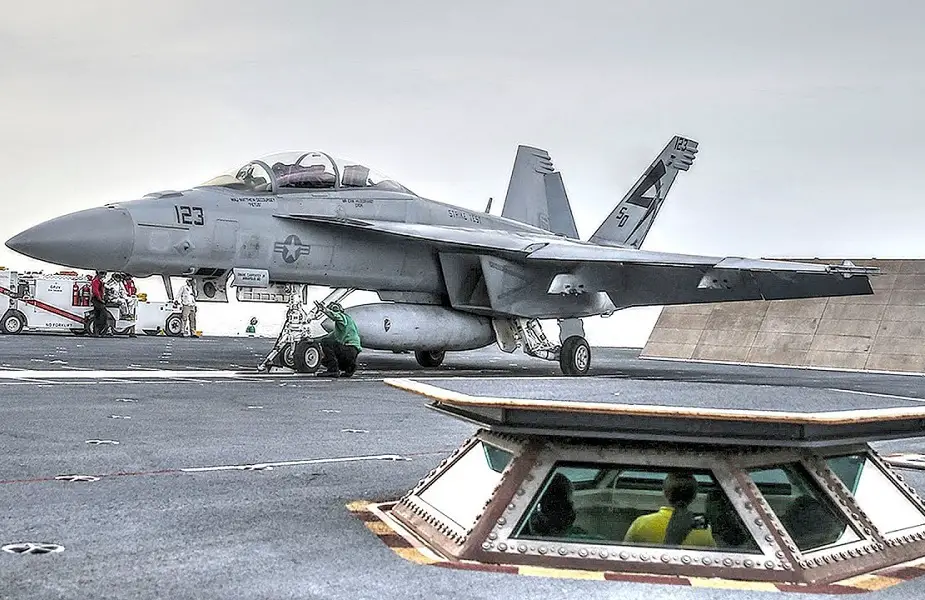Breaking news
US approves foreign military sale of EMALS and AAG to France.
The State Department has made a determination approving a possible Foreign Military Sale to the Government of France of Electromagnetic Aircraft Launch System (EMALS), Advanced Arresting Gear (AAG), and related equipment for an estimated cost of $1.321 billion. The Defense Security Cooperation Agency delivered the required certification notifying Congress of this possible sale on December 21.
Follow Navy Recognition on Google News at this link
 A F/A-18E Super Hornet of US Navy ready to take off from USS Ford with the Electromagnetic Aircraft Launch System (EMALS) (Picture source: US Navy)(Picture source: US Navy)
A F/A-18E Super Hornet of US Navy ready to take off from USS Ford with the Electromagnetic Aircraft Launch System (EMALS) (Picture source: US Navy)(Picture source: US Navy)
The Government of France has requested to buy one (1) Electromagnetic Aircraft Launch System (EMALS), 2 launcher configuration; and one (1) Advanced Arresting Gear (AAG), 3 engine configuration. Also included are land-based testing and test spares; shipboard install; testing and certification support; shipboard spares; peculiar support equipment; government furnished equipment; multi-purpose reconfigurable training system; operator and maintainer training; integrated electronic technical manuals; drawings and interface control documents; technical assistance; contractor engineering technical services; and other related elements of logistical and program support. The estimated total cost is $1.321 billion.
The Electromagnetic Aircraft Launch System (EMALS) is a type of aircraft launching system developed by General Atomics for the United States Navy. The system launches carrier-based aircraft by means of a catapult employing a linear induction motor rather than the conventional steam piston. EMALS was first installed on the United States Navy's Gerald R. Ford-class aircraft carrier, USS Gerald R. Ford. Its main advantage is that it accelerates aircraft more smoothly, putting less stress on their airframes. Compared to steam catapults, the EMALS also weighs less, is expected to cost less and require less maintenance, and can launch both heavier and lighter aircraft than a steam piston-driven system. It also reduces the carrier's requirement of fresh water, thus reducing the demand for energy-intensive desalination.
The Advanced Arresting Gear (AAG) is a type of arresting gear currently in development by General Atomics for the U.S. Navy's newest Gerald R. Ford-class aircraft carriers. An arresting gear, or arrestor gear, is a mechanical system used to rapidly decelerate an aircraft as it lands. Arresting gear on aircraft carriers is an essential component of naval aviation, and it is most commonly used on CATOBAR and STOBAR aircraft carriers. Similar systems are also found at land-based airfields for expeditionary or emergency use. Typical systems consist of several steel wire ropes laid across the aircraft landing area, designed to be caught by an aircraft's tailhook. During a normal arrestment, the tailhook engages the wire and the aircraft's kinetic energy is transferred to hydraulic damping systems attached below the carrier deck.
This proposed sale will support the foreign policy and national security of the United States by helping to improve security of a NATO ally which is an important force for political stability and economic progress in Europe.
The proposed sale will result in continuation of interoperability between the United States and France. EMALS and AAG will be incorporated in France’s next-generation aircraft carrier program. France will have no difficulty absorbing this equipment into its armed forces.
The proposed sale of this equipment and support will not alter the basic military balance in the region.
The prime contractors will be General Atomics-Electromagnetic Systems Group, San Diego, CA; and Huntington Ingalls Industries, Newport News, VA. There are no known offset agreements proposed in conjunction with this potential sale.
Implementation of this proposed sale will require the assignment of approximately (40) U.S. Government and contractor representatives to France for 10 weeks per year in calendar years 2033-2038, to support shipboard system installation, commissioning, certification, aircraft compatibility testing, flight deck certification and sea trials.

























